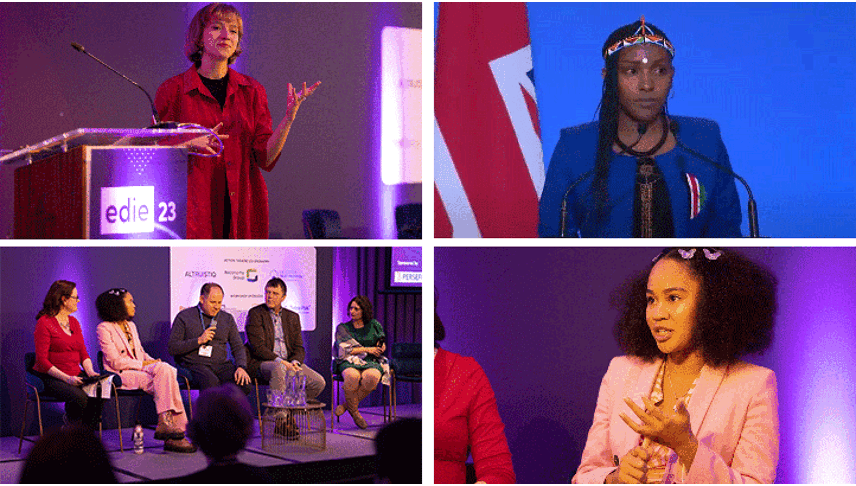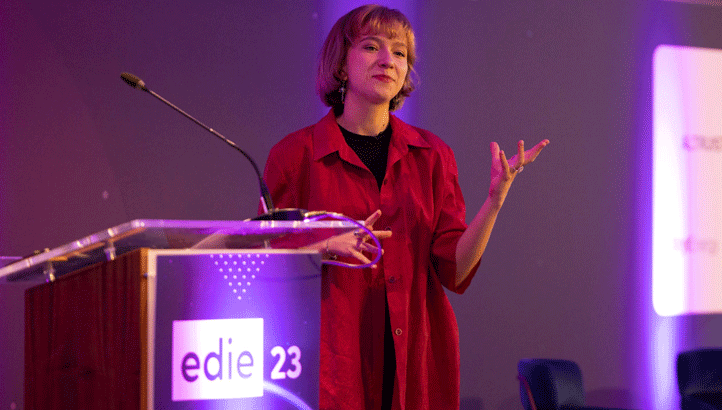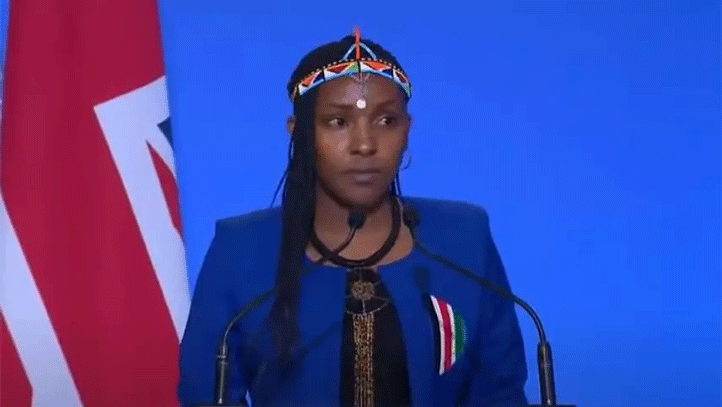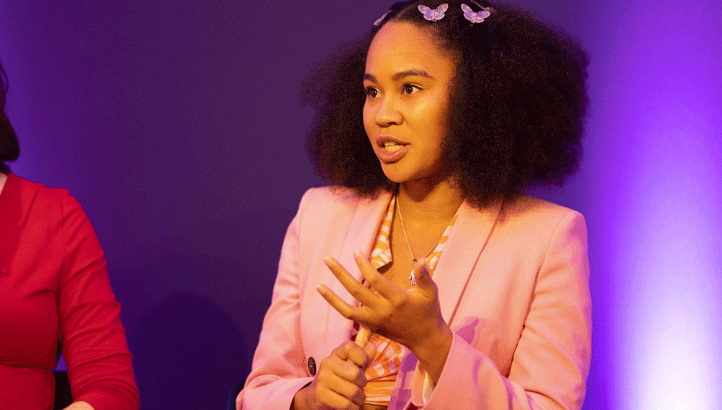Register for free and continue reading
Join our growing army of changemakers and get unlimited access to our premium content

Images: Mark Lacey. Image top-right: Karwai Tang
Hosted in London on 1-2 March, edie 23 was our biggest event of the year, convening more than 600 sustainability and energy professionals for two days of sessions dedicated to informing and inspiring attendees to be courageous leaders that push for environmental and social transformations for a sustainable future.
More than 120 speakers took part in edie 23 and among them were three young climate activists, reminding attendees of the importance of intergenerational work to deliver an equitable transition to a sustainable future.
Here, we pull out the key calls to action from these activists – Clover Hogan, Elizabeth Wathuti and Mikaela Loach.
CLOVER HOGAN
Image: Mark Lacey
Australian-born Clover Hogan is the founder of Force of Nature – an organisation that describes its purpose as “mobilising mindsets for climate action”. It does this by working with students, schools, businesses and other organisations and groups to facilitate inter-generational climate conversations that lead to the adoption of meaningful solutions.
Hogan delivered the closing keynote speech on Day Two of edie 23, and explained why putting youth climate activists on a pedestal will not effect change. She said: “We’re often told that we are inspiring and carrying the baton of hope. Yet we’re systematically being excluded from decisions governing our future.”
Hogan also spoke of the extent of mindset change needed from the private sector and policymakers, drawing on her own experience attending COP21 in Paris: “For the first time in my path, my career as an activist, I remember feeling a sense of relief and a true sense of hope. I thought that finally, decision makers – people with real power – were coming around the table to act with the urgency that this emergency demands. And, yet, the first event I showed up was the sustainable innovation forum, sponsored by the likes of Coca-Cola, BMW and Shell. Iconic polluters and contributors to the climate crisis. I’ve never seen greenwashing on such an unapologetic scale. I’d never met leaders so fluent in making commitments scheduled far enough into the future that they required no immediate action.
“I knew grief. I knew anger. But I’d never felt so powerless…. While COP had shown me that we had had the technology, the resources, the ingenuity to solve the climate crisis for decades, critically, we lacked the mindset.
“Someone from one of the world’s biggest plastic polluters told me: ‘we’re a global, for-profit company. Our business model is fundamentally at odds with sustainability. Change is not possible’. A high-flier within a legal firm said: ‘We shouldn’t have to do anything until China stops burning coal.’
“Today, leaders are more concerned with being seen to do the right thing than getting on and doing it.
“We need leaders willing to disrupt themselves before it comes in the way of regulation or in the climate crisis lapping at our front doors. We all need to challenge ourselves. My questions to all of you is: What must you do to challenge your own mindset? Which voices must you invite into the room so that you can step up rather than shut down?”
ELIZABETH WATHUTI
Image: Karwai Tang/ UK Government COP26 division
Kenyan climate activist Elizabeth Wathuti is the founder of the Green Generation Initiative, which enables tree planting at schools across the nation. She captured hearts and minds in the global sustainability space with her rousing speech at COP26, where she implored world leaders to “open their hearts” and listen to the most climate-impacted communities and turn their calls to action into tangible change.
Appearing via video call at edie 23, she reflected on the extent to which her words have been heard and made the same call to action as drought continues across the Horn of Africa.
Wathuti, delivering a keynote speech and panel alongside former Unilever chief executive Paul Polman, said: “I believe that we can, absolutely, navigate our way out of the planetary crises that we face. But for us to be able to do so, we are going to need to change our way of thinking and begin to tell new stories about what is possible – and, also, what is important.
“It has been more than a year now since I joined world leaders on the stage at COP26 and, even more recently, at Davos, I made the same plea for the world leaders to open their hearts and have the grace to the most-affected, climate-affected communities. The fight for implementation and delivery is still going on. I believe that an open heart is where the seed of true action lies within each of us.
“We have to close every loophole that enables delay and also glorifies inaction, because every degree of inaction makes [the transition] much more costly and with every degree of inaction, it is generations including mine that will bear the bigger brunt.
“We have to show [leaders] not to wait until we are in high positions of power and influence to make change, because we know that for us to achieve a safe future in the liveable world that we all envision, we all must do it now.”
You can listen to Wathuti’s speech at edie 23 in full here.
MIKAELA LOACH
Image: Mark Lacey
With more than 154,000 followers on Instagram, Mikaela Loach is perhaps one of the UK’s most widely known climate justice activists. She is known for her work as co-presenter of the YIKES podcast and her participation in the Paid to Pollute court case which aimed to end fossil fuel subsidies from the UK Government, among all manner of other impactful projects. Loach is currently preparing to launch her first book, ‘It’s Not that Radical’.
Loach used her platform at edie 23 to urge sustainability professionals to “prioritise justice and rip up the roots of the systems that built our very oppressive world”.
She said: “The climate crisis didn’t come out of nowhere. It’s not an accident. Companies all over the world knew about this crisis and deliberately continued and perpetuated it. It’s not inaction on climate – it is deliberate action to make it worse.
“This is because some lives have ended up being less valued than others – this is what happens under this global capitalist system. In order for them to have their people at the top, they need to devalue the lives of people at the bottom in order to make it acceptable to pay people slave wages or to destroy their rivers or poison their homes.
“The climate crisis was created through these systems. We have an opportunity to create something better… when we tackle white supremacy, capitalism and all of the linked oppressive systems.
“I think that we should have the bravery to realise that things which have seemed impossible in the past have become possible… it’s up to us what’s possible or not. Net-zero is possible, and not just net-zero, but real zero. I get really frustrated when we act like creating a world where people live in dignity and are not harmed and oppressed is this ridiculous, radical ask. It should be the bare basic.
“My hesitancy with technological solutions – and you might have seen a video of me where I challenged Bill Gates at his own event… is that people like Gates are obsessed with technological solutions… because these people are trying to keep the world as it is now, which they benefit from extremely by extracting wealth from the majority of people and harming the majority of people.”
You can visit the edie 23 website here.





Please login or Register to leave a comment.